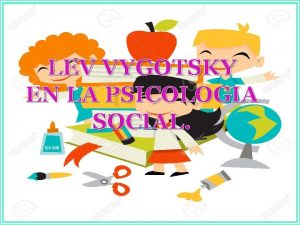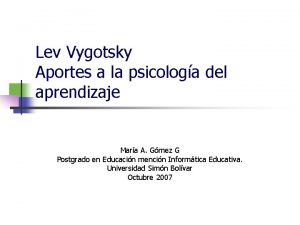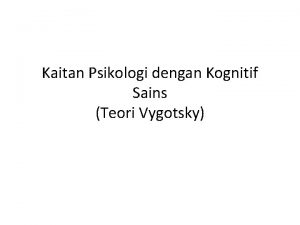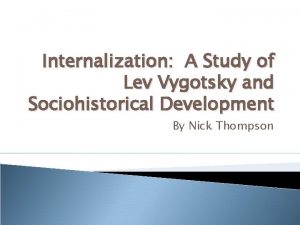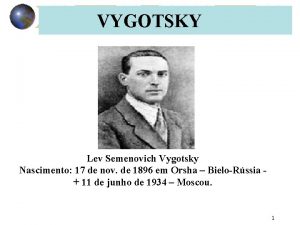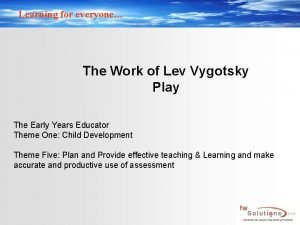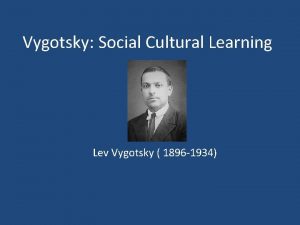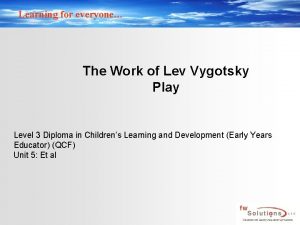Learning for everyone The Work of Lev Vygotsky








- Slides: 8

Learning for everyone… The Work of Lev Vygotsky Play The Early Years Educator Theme One: Child Development Theme Five: Plan and Provide effective teaching & Learning and make accurate and productive use of assessment

Learning for everyone… Introduction Ø Imaginative play is a crucial component of a child's normal development. Ø What may seem to be a simple and uncomplicated way for children to entertain themselves is actually a complex process that affects all aspects of a child's life. Ø Play shapes how children make sense of their worlds, how they learn thinking skills, and how they acquire language. Ø So how does imaginative play boost a child's brain development? Ø How can it affect cognition? Ø There a multitude of ways in which unstructured, child-centered play builds healthy minds.

Learning for everyone… Language Development and Play Ø Children have dialogues with themselves when they engage in imaginative play. Ø Role-playing means creating a story and giving a voice to the different characters in the story. Ø When children imitate others, they are developing a vocabulary that allows them to name and navigate the world around them. Ø Less verbal children may talk more during imaginative play than in other settings.

Learning for everyone… Language Development and Play Ø Vygotsky’s theory of cognitive development posits that information from the external world is transformed and internalized through language. Ø Since language is both a symbolic system of communication and a cultural tool used to transmit culture and history, Ø play is an essential part of both language development and a child's understanding of the external world. Ø When a child is at play, he or she is in a constant dialogue either with self or others. Ø Children at play are making sense of the world through a process of "inner speech" - that is, they are often talking out loud to themselves. Ø As adults, we lose this capacity because it is not socially sanctioned.

Learning for everyone… Language Development and Play Ø Vygotsky’s Theory: Ø If we really listen to children at play, we can hear the way they converse with themselves in order to make sense of the external world. Ø Mimicking adults is often the most obvious way this process can be observed. ("Now, let's wash our hands and eat supper" a child playing "family" might say, for instance). Ø According to Vygotsky, language also serves the purpose of regulation, or self-control over one's own cognitive processes such as memory and thought. Ø As we develop, we transition from being other-regulated to being self -regulated in our cognitive processes. Ø Discovering language via play is an essential part of this transition

Learning for everyone… The social interaction of play develops cognition Ø Vygotsky was also interested in the role of social interaction on cognitive development and argued that development first takes place socially. Ø That is, children observe parental behaviour, listen to parents' speech, and then try to imitate them. As children practice through imitation, parents will guide children, correct them, and provide challenges. Ø Through child-centred play, children take on different roles and try out different language uses, all of which help them on the journey from being externally regulated to internally regulated in cognition. Ø Through play, children become more competent in their language use and begin to regulate their own thought processes.

Learning for everyone… Problem solving skills and play Ø Vygotsky proposed that a child's performance differs between instances in which he tries to solve a problem alone and when another child or adult assists the child. Ø He refers to this difference as the "zone of proximal development. " Ø How does this relate to play? If a child is learning to complete a task, such as building a bridge with blocks, and a more competent person provides assistance, then the child is able to move into a new zone of development and problem solving. Ø Vygotsky refers to this process of assisting as "scaffolding, " which helps bridge the difference between a child's current level of problem-solving and his potential for more complex problem solving.

Learning for everyone… Problem solving skills and play Ø Imaginative play is essential to cognitive development, but it is becoming endangered by our busy lives. Ø Children who do not engage in imaginative play because their time is overly structured or spent watching television or other forms of media are not developing the language and reasoning skills that are so critical to early childhood development.

